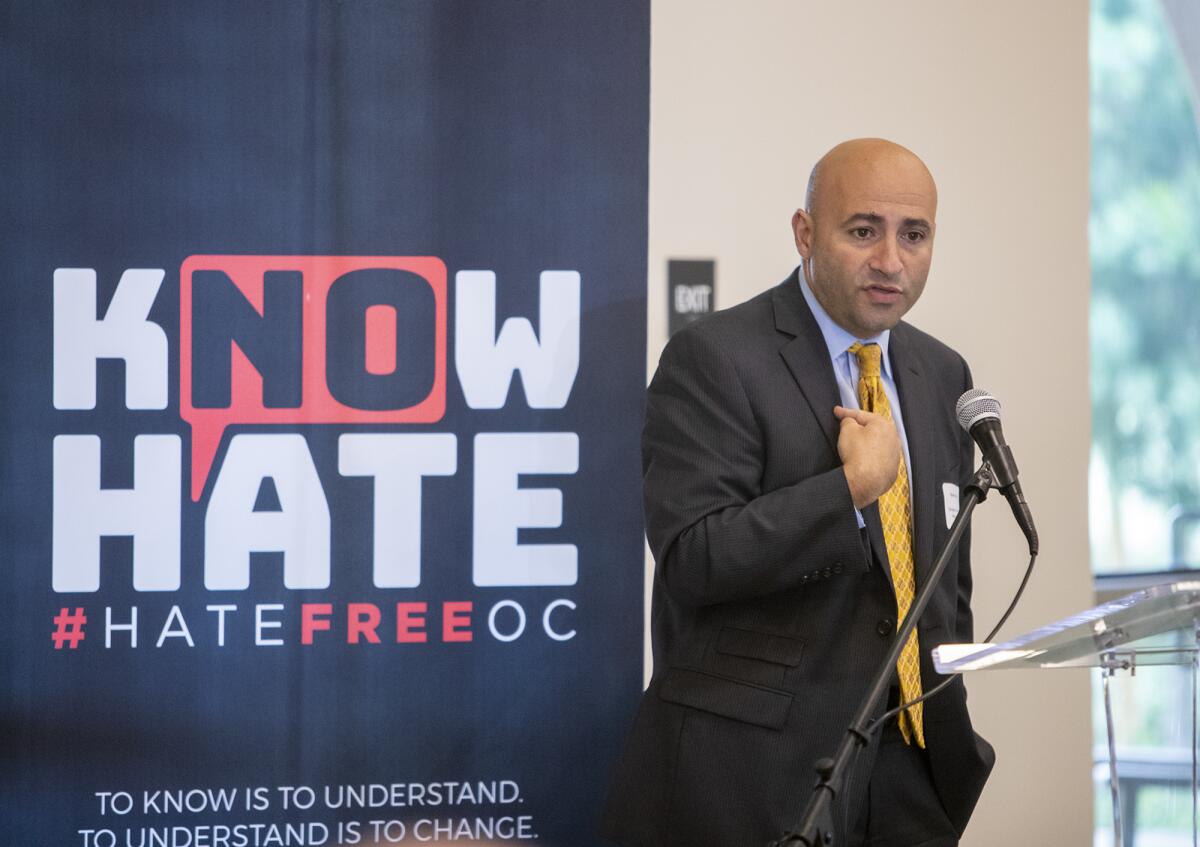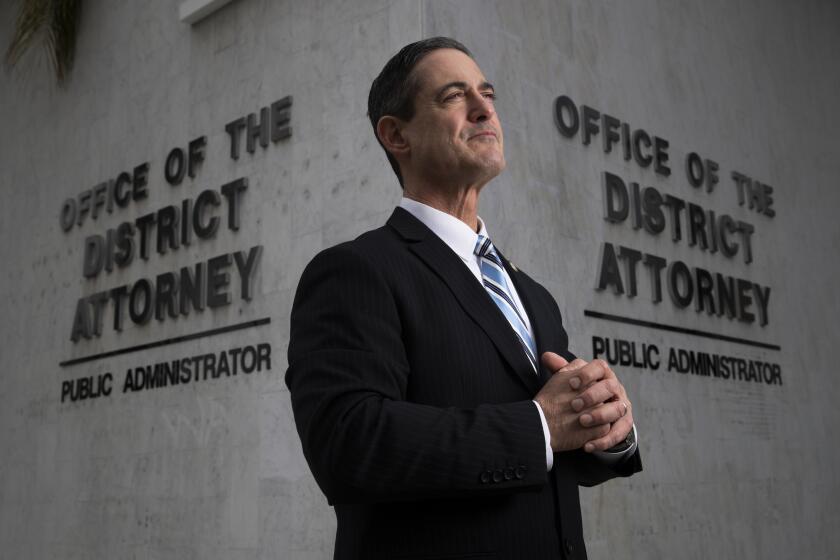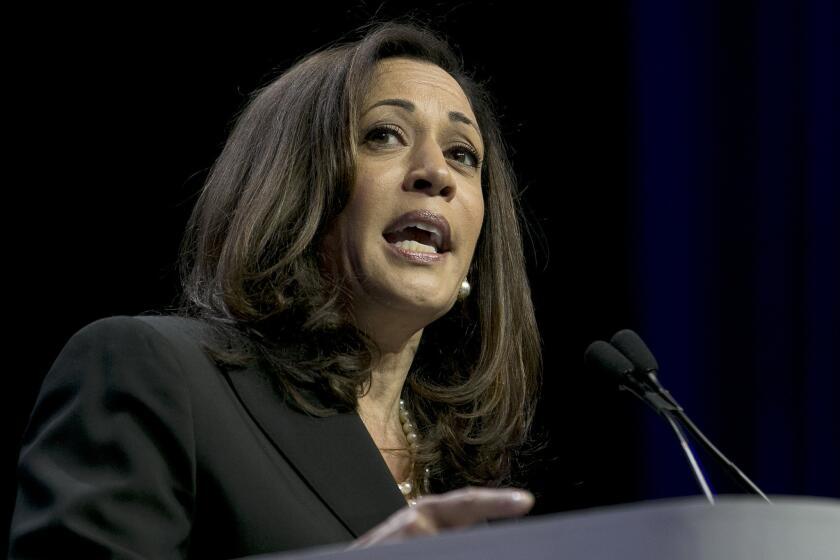Orange County D.A. fires senior prosecutor in latest fallout from jailhouse informant scandal

- Share via
A prominent Orange County prosecutor was fired Wednesday after an independent investigation sparked by a 2010 murder conviction that was overturned last year over allegations of withheld evidence, authorities confirmed.
Dist. Atty. Todd Spitzer said the investigation concluded Tuesday after examining whether Ebrahim Baytieh failed to properly turn over evidence in discovery and whether he was truthful when questioned by the U.S. Department of Justice in an ongoing federal probe into prosecutors’ use of jailhouse informants.
As a result of the inquiry, Baytieh was terminated, Spitzer said.
“I made it unequivocally clear when I ran … that I would not tolerate the ‘win at all costs’ mentality of the prior administration,” he said. “My prosecutors will not violate the Constitution and the rights of defendants in order to get convictions.”
Baytieh, who was a senior assistant district attorney and is running to become an Orange County Superior Court judge, could not be reached by phone or email Wednesday night for comment.
Spitzer said he immediately hired an independent law firm to investigate Baytieh after conceding in August to the new trial for Paul Gentile Smith, who was convicted of murder in 2010 in a case Baytieh prosecuted.
Nearly five years have passed since a lawyer representing the man who slaughtered eight people inside a Seal Beach salon first raised questions about the way investigators used informants inside Orange County’s jails.
Smith, now 61, was accused of torturing and killing a friend, 29-year-old Robert Haugen, in 1988. His body was found nearly decapitated in a burning Sunset Beach apartment.
The case stayed cold until 2009, when Smith submitted DNA after an unrelated arrest in Nevada. The DNA was matched to blood at Haugen’s apartment, the district attorney’s office said at the time. Smith was Haugen’s friend since high school and denied killing him. He claimed his blood was found because he was there the night before the killing and had nicked himself with a small knife while cutting marijuana, prosecutors said at the time.
He was sentenced to life in prison without parole on Nov. 29, 2010.
But the conviction was overturned in August when O.C. Superior Court Judge Patrick Donahue granted Smith a new trial, a move that came amid hearings requested by assistant public defenders Scott Sanders and Sara Ross over whether Smith’s constitutional rights were violated when he was allegedly targeted by jailhouse informants.
That case, along with Baytieh’s conduct, came under increasing scrutiny after a scandal in Orange County over prosecutors’ use of jailhouse informants became a major factor in longtime Dist. Atty. Tony Rackauckas’ electoral loss to Spitzer in 2018.
Sanders and Ross alleged information about Smith obtained by the informants was withheld from defense attorneys in 2010.
Shortly after Smith was granted a new trial, Judge Gregg L. Prickett recused himself from overseeing the case because he’d endorsed Baytieh’s run for judge.
After a four-year investigation into the Orange County Sheriff’s Department ended with no explanation and no criminal charges in 2019, law enforcement officials and attorneys have begun to speak about some of the limits -- and shortcomings -- of the California attorney general’s office review of the case.
The overturning of Smith’s case came years after the Orange County informant scandal broke into the public eye. In 2014, Sanders started asking questions while representing Scott Dekraai, who’d confessed to killing eight people in a Seal Beach hair salon in 2011.
The defense attorney alleged that Orange County sheriff’s deputies planted a prolific snitch and reputed Mexican Mafia shot-caller in Dekraai’s cell, and covered up their illegal acts.
Jailhouse records soon proved Sanders right, embroiling the district attorney’s office and Sheriff’s Department in a national scandal. The state attorney general’s office opened what became a four-year investigation into both agencies in 2015; the U.S. Department of Justice followed suit the next year, and its inquiry is ongoing.
Orange County prosecutors were kicked off Dekraai’s case, and a judge cited the informant scheme in sparing him from California’s death row. The American Civil Liberties Union filed a lawsuit accusing authorities of having deployed “professional” informants for decades.
After defeating Rackauckas in the 2018 election, Spitzer said he would not letting the agency’s past failings go unanswered, telling The Times in 2019 that he turned over thousands of pages of training documents and nearly 100 case files to federal investigators.
At the time, Spitzer wouldn’t describe the nature of the cases or say whether they involved informant misuse.
It was not clear Wednesday whether the Smith case was among them.
More to Read
Sign up for Essential California
The most important California stories and recommendations in your inbox every morning.
You may occasionally receive promotional content from the Los Angeles Times.













